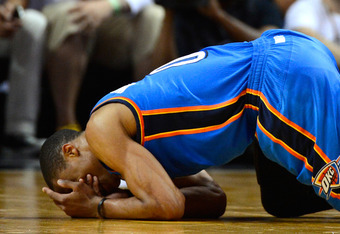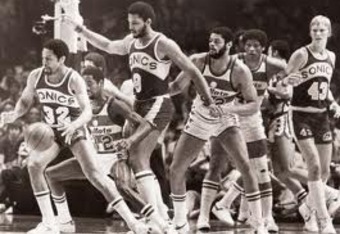Kevin Durant and his Oklahoma City Thunder joined 28 other NBA teams in “wait till next year†mode last Thursday in Miami.
Young, struggling squads like Charlotte and New Orleans aspire to distinguish real gold from pyrite in this week's upcoming NBA draft. Up-and-comers like Philadelphia and Denver strive to establish a winner’s mentality, and veteran-laden outfits such as the Spurs, Lakers and Celtics look to retool rather than rebuild.
But OKC general manager Sam Presti and head coach Scott Brooks have just witnessed their precocious young athletes knock out three recent titlists en route to their franchise's third NBA Finals defeat. Despite capturing but one game from the South Beach stalwarts while losing “fair and square,†there appears to be good cause for optimism.
In the first four games of the finals, series- and season-MVP LeBron James’ extraordinary play pushed his Heat to a commanding 3-1series lead, but many of the numbers gave the impression of a more competitive matchup.
Consider:
| Â | Points | Field Goals | Rebounds | Turnovers | Efficiency |
| Thunder | 384 | 147-315, .467 | (39) 152 | 42 | .528 |
| Heat | 389 | 138-307, .450 | (41) 160 | 44 | .525 |
 Ronald Martinez/Getty Images
Ronald Martinez/Getty Images
Particularly noteworthy, the playoffs seemed to alter the Thunder’s season-long habit of not taking care of the ball. In their 66 regular season contests, they committed 1,079 turnovers, wasting 16.8 percent of their 6,410 total possessions. That rate of turnovers was second highest in the league.
In their 20 playoff games, OKC forfeited 263 of their 1,868 possessions to turnovers, only 11.9 percent.
In Game 1 of their Western Conference semifinals series against the Los Angeles Lakers, the run-and-gun Thunder committed a mere FOUR turnovers while playing to a 63.7 percent rate of offensive efficiencyâ€"the most effective performance by any team in 84 2012 NBA playoff tilts.
Facing an 0-2 deficit against a team riding a 20-game winning streak in Game 3 of the Western Conference finals, the young and callous Oklahomans (or should that be Oklahomen?) ratcheted up their defensive efforts to force 21 turnovers and hold the heady San Antonio Spurs to 39.5 percent field-goal shooting and a mere 15 free-throw attempts while limiting their offensive efficiency to 40.2 percent. Six nights later, the Spurs’ season was over.
As we’ve noted, two earlier incarnations of this franchiseâ€"during its Seattle daysâ€"fell short of the brass ring in the final round.
Most recently, a Gary Payton and Shawn Kemp-led outfit under the direction of head coach George Karl fell to Michael Jordan’s Chicago Bulls in 1996. Unfortunately, age and Kemp’s compulsions relegated these Sonics to Draft Lottery status within two years.
The Seattle Supersonics first advanced to the NBA Finals in the 11th year of their existence in 1978, facing the Washington Bullets’ Hall of Fame-bound duo of Wesley Unseld and Elvin Hayes and falling in seven tough games. Unlike the veteran-heavy ’96 runners-up, the 1977-78 squad of Hall of Fame player and coach Lenny Wilkens bears a striking resemblance to the current version of the Thunder.
 image from sportsyakima.com
image from sportsyakima.com
Both started a very young point guard from a Los Angeles school who was subjected to substantial criticism for a “score first†mentality (Gus Williams of USC; Russell Westbrook of UCLA).
The off-guards, culled from more obscure outposts than their running mates, were first and foremost defensive stoppers (Pepperdine’s Dennis Johnson; Switzerland’s Thabo Sefolosha).Â
The interior defense of each unit was anchored by one of the best shot-blockers of his era (Marvin “The Human Eraser†Webster from Morgan State; Serge Ibaka from the Congo).Â
Each sported an explosive sixth man with a reputation as a gunner (Downtown Freddie Brown; James Harden).Â
Both of these fine teams featured a marvelously versatile small forward (Johnny Johnson, perhaps the NBA’s original point forward; three-time scoring king Kevin Durant).Â
Both rotations even included the bench support of a multi-champion (former Celtic Paul Silas; former Laker Derek Fisher).Â
A heady, role-playing postman rounds out the parallels (current Timberwolves assistant Jack Sikma; Kendrick Perkins).
Readers who are up on their NBA history already know that the repulsed ’78 Sonicsâ€"despite the loss of Webster to the New York Knicks in free agency and the addition of Lonnie Shelton as compensationâ€"rebounded to defeat those selfsame Bullets the following season and hoist the franchise’s lone championship banner.
Which fate awaits the 2012-13 Oklahoma City Thunder? The championship success of the ‘70s or the struggles and disappointment of their ‘90s predecessors?
The similarities to the 1979 World Champions are many. But like their ’96 counterparts, this Thunder bunch is challenged by a truly iconic nemesis bound and determined to reach Mount Rushmore.
Sustaining success just might be the most daunting task in the world of high-level competitive sports.
Are the Oklahoma City Thunder destined to be perennial contenders, or was this playoff run their 15 minutes of collective fame?
It appears as if we’re all in “wait till next year†mode. Time, as always, will tell the tale.
No comments:
Post a Comment